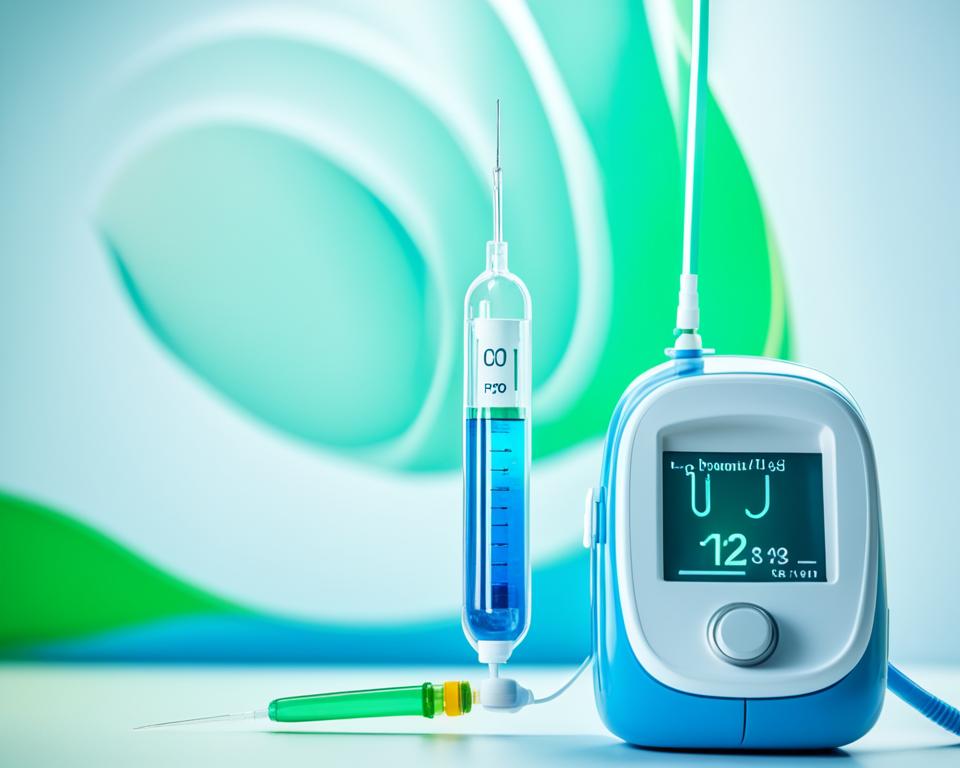
What Diabetes Medicine Is Safe for Kidneys?
Diabetes is a chronic condition that can have a significant impact on kidney health. People with diabetes are at an increased risk of developing kidney disease, also known as diabetic nephropathy. This article will explore the various diabetes medications that are considered kidney-safe, providing guidance on managing diabetes while protecting renal health.
Read interesting things at : revolutionbookscamb
Key Takeaways
- Certain diabetes medications, such as metformin, GLP-1 agonists, and SGLT-2 inhibitors, are considered relatively kidney-friendly.
- Insulin therapy, when monitored and adjusted appropriately, can also be a viable option for individuals with diabetes-related kidney disease.
- Maintaining tight control over blood glucose levels is essential for preserving kidney health.
- Regular kidney function tests and medication adjustments are crucial for managing diabetes in a way that supports renal health.
- Collaboration between healthcare providers, such as endocrinologists and nephrologists, is key for comprehensive diabetic kidney care.
Understanding the Impact of Diabetes on Kidney Health
Diabetes can have a profound impact on the health of the kidneys, often leading to a condition known as diabetic nephropathy. This occurs when the high blood sugar levels associated with diabetes cause damage to the delicate blood vessels and filters within the kidneys, gradually impairing their function over time.
Diabetic Nephropathy: A Common Complication
Diabetic kidney disease in diabetes is a serious and widespread complication of the disease. As the kidneys become damaged, they are less able to effectively filter waste products from the bloodstream, leading to a gradual decline in overall kidney function. This can ultimately result in the need for dialysis or even kidney transplantation if left unchecked.
Risk Factors for Kidney Disease in Diabetes
Several key factors can increase the risk of developing diabetic kidney disease for individuals with diabetes. These include:
- Poor blood sugar control
- High blood pressure
- Genetic predisposition
- Duration of diabetes
By understanding these risk factors for diabetic kidney disease and taking proactive steps to manage them, individuals with diabetes can work to prevent or delay the onset of this serious complication.
Metformin: A Kidney-Friendly Option
Metformin is a widely used first-line medication for the treatment of type 2 diabetes. It works by reducing the metformin works amount of glucose produced by the liver and increasing the body’s sensitivity to insulin. Importantly, metformin is generally considered a metformin kidney safe safe option for individuals with kidney disease, as it is primarily eliminated through the kidneys. However, metformin dosage kidney dosage adjustments may be necessary based on the individual’s level of kidney function.
How Metformin Works
Metformin is an oral antidiabetic medication that belongs to the biguanide class. It primarily functions by decreasing the amount of glucose produced by the liver and enhancing the body’s sensitivity to insulin, leading to improved blood sugar regulation. This dual mechanism of action makes metformin an effective and widely prescribed treatment for individuals with type 2 diabetes.
Dosage Considerations for Kidney Function
While metformin is generally considered a safe option for individuals with kidney disease, it is essential to monitor the patient’s kidney function and adjust the dosage accordingly. Metformin is primarily eliminated through the kidneys, and reduced renal function can lead to an increased risk of lactic acidosis, a rare but potentially serious complication. Healthcare providers typically recommend starting with a lower metformin dosage and gradually increasing it based on the patient’s response and kidney function tests, such as estimated glomerular filtration rate (eGFR).
GLP-1 Agonists: Beneficial for Both Diabetes and Kidneys
GLP-1 (Glucagon-like Peptide-1) agonists are a class of diabetes medications that have gained significant attention for their potential to provide dual benefits: improving blood sugar control and protecting kidney health. These innovative therapies work by stimulating the release of insulin and reducing the production of glucagon, two essential hormones involved in regulating blood glucose levels.
Understanding GLP-1 Agonists
GLP-1 agonists mimic the action of the naturally occurring GLP-1 hormone, which plays a crucial role in the body’s insulin response. By enhancing insulin secretion and suppressing glucagon release, these medications help to maintain healthy blood sugar levels in individuals with diabetes. Importantly, some GLP-1 agonists have also demonstrated renal-protective effects, making them a potentially safe and effective option for those with diabetes-related kidney disease.
Renal-Safe GLP-1 Agonist Options
Within the GLP-1 agonist class, there are several kidney-friendly options available. Medications such as liraglutide, dulaglutide, and semaglutide have been shown to have a positive impact on kidney function and may help to slow the progression of diabetic nephropathy. Healthcare providers can work closely with patients to determine the most appropriate GLP-1 agonist based on individual factors, such as kidney health status and overall disease management needs.
DPP-4 Inhibitors: Potentially Safe for Kidney Patients
DPP-4 (Dipeptidyl Peptidase-4) inhibitors are another class of diabetes medications that may be considered safe for individuals with kidney disease. These drugs work by inhibiting the DPP-4 enzyme, which helps to regulate blood sugar levels. While the evidence is not as extensive as for GLP-1 agonists, some DPP-4 inhibitors have demonstrated a neutral or even positive impact on kidney function in people with diabetes.
One of the key advantages of DPP-4 inhibitors is their potential to be used safely in patients with DPP-4 inhibitors kidney safe. Unlike some other diabetes medications, DPP-4 inhibitors are primarily eliminated through the kidneys, making them a viable option for those with impaired renal function. However, it is crucial to monitor kidney function closely and adjust dosages accordingly when using these medications.
Additionally, recent studies have suggested that certain DPP-4 inhibitors may have DPP-4 inhibitors for diabetic kidney disease. This is particularly promising for individuals with diabetes who are at risk of or have already developed kidney complications. By choosing a DPP-4 inhibitor that has demonstrated renal-protective effects, healthcare providers can help to preserve kidney health and slow the progression of diabetic nephropathy.
Overall, while DPP-4 inhibitors may not be as extensively studied as some other diabetes medications in terms of their impact on kidney function, they remain a viable option for many individuals with kidney disease. As with any diabetes treatment, it is essential to work closely with healthcare providers to determine the most appropriate and safest course of action for managing both diabetes and kidney health.
SGLT-2 Inhibitors: Emerging as Kidney-Protective
SGLT-2 (Sodium-Glucose Cotransporter-2) inhibitors are a relatively new class of diabetes medications that have shown promising results in terms of kidney health. These drugs work by blocking the reabsorption of glucose in the kidneys, leading to increased excretion of glucose in the urine. This unique mechanism of action not only helps to lower blood sugar levels but also has a protective effect on the kidneys, making SGLT-2 inhibitors kidney safe and a potentially valuable option for individuals with diabetes-related kidney disease.
How SGLT-2 Inhibitors Work
The primary way SGLT-2 inhibitors work is by inhibiting the sodium-glucose cotransporter-2 (SGLT-2) in the kidneys. This transporter is responsible for reabsorbing the majority of the glucose that is filtered by the kidneys. By blocking SGLT-2, these medications reduce the amount of glucose that is reabsorbed, leading to its increased excretion through urine. This reduced glucose reabsorption not only lowers blood glucose levels but also helps to alleviate the strain on the kidneys, potentially slowing the progression of diabetic kidney disease.
Renal Benefits of SGLT-2 Inhibitors
In addition to their glucose-lowering effects, SGLT-2 inhibitors have been shown to provide kidney protection in individuals with diabetes. Several studies have demonstrated that these medications can help to reduce the risk of developing or worsening diabetic nephropathy, a common complication of diabetes that can lead to chronic kidney disease. The proposed mechanisms for this renal-protective effect include improved blood flow to the kidneys, reduced inflammation, and decreased oxidative stress within the kidney tissues.
Insulin Therapy: A Necessity for Some Diabetics
For some individuals with diabetes, insulin therapy may be a necessary treatment. While insulin itself is not typically associated with negative effects on kidney function, it is essential to closely monitor kidney health and adjust insulin dosages accordingly.
Types of Insulin and Kidney Safety
Different types of insulin may have varying impacts on the kidneys. Healthcare providers must carefully evaluate the suitability of each insulin formulation for patients with kidney disease to ensure the safest and most effective management of their condition.
Monitoring Kidney Function on Insulin
Regular monitoring of kidney function is crucial for individuals with diabetes who are using insulin. This may involve periodic testing of serum creatinine levels and estimated glomerular filtration rate (eGFR) to assess any changes in kidney function over time. Adjusting insulin dosages based on these findings can help to protect kidney health and prevent further deterioration.

Factors to Consider for Kidney-Safe Diabetes Management
When managing diabetes with the goal of protecting kidney health, there are several key factors to consider. Maintaining tight control over blood glucose levels is essential, as high blood sugar can contribute to the development and progression of diabetic kidney disease. Healthcare providers may need to carefully evaluate each patient’s individual circumstances, such as their overall health, comorbidities, and response to various diabetes medications, in order to develop the most appropriate and effective treatment plan.
Importance of Blood Glucose Control
Achieving and maintaining optimal blood glucose control is a critical component of kidney-safe diabetes management. High blood sugar levels can cause damage to the delicate structures within the kidneys, leading to the development and progression of diabetic nephropathy. By ensuring tight control of blood glucose levels, individuals with diabetes can help to preserve their kidney function and reduce the risk of kidney disease.
Non-Pharmacological Approaches for Kidney Health
While medications play a crucial role in managing diabetes and preserving kidney function, non-pharmacological interventions can also have a significant impact on the health of the kidneys. By adopting dietary modifications and lifestyle changes, individuals with diabetes can take proactive steps to support their renal well-being.
Dietary Modifications
One of the key non-pharmacological approaches for kidney health in diabetes is to make targeted dietary adjustments. Reducing the intake of sodium and protein can help alleviate the strain on the kidneys, which are responsible for filtering these substances from the bloodstream. By being mindful of portion sizes and focusing on kidney-friendly foods, individuals with diabetic kidney disease can potentially slow the progression of renal complications.
Exercise and Lifestyle Changes
Alongside dietary modifications, regular physical activity and other lifestyle changes can contribute to improved kidney health in diabetes. Engaging in regular exercise, such as brisk walking, swimming, or low-impact aerobics, can help manage blood sugar levels, promote weight loss, and enhance overall cardiovascular health, all of which can positively impact kidney function. Additionally, quitting smoking and maintaining a healthy body weight can further support diabetic kidney health.
Monitoring and Adjusting Medication
Ongoing monitoring of kidney function and medication adjustments are crucial for managing diabetes in a way that supports kidney health. Regular kidney function tests, such as measuring serum creatinine and estimated glomerular filtration rate (eGFR), can help healthcare providers identify any changes in kidney function and make necessary adjustments to the treatment plan.
Regular Kidney Function Tests
These essential tests provide a clear picture of how well the kidneys are filtering waste and excess fluids from the body. By closely monitoring kidney function in diabetes, healthcare professionals can ensure that the chosen diabetes medications are not causing further damage to the kidneys.
Adjusting Dosages and Switching Medications
Based on the results of regular kidney function tests, healthcare providers may need to adjust the dosages of existing diabetes medications or even consider switching to alternative treatments that are more kidney-friendly. This personalized approach helps to protect kidney health while still effectively managing the individual’s diabetes.
By staying vigilant and making timely adjustments to the treatment plan, individuals with diabetes can work closely with their healthcare team to optimize medication for their kidney health and reduce the risk of diabetic nephropathy.

Collaboration Between Healthcare Providers
Effective management of diabetes and kidney health often requires the collaboration of multiple healthcare providers, including endocrinologists (specialists in diabetes care) and nephrologists (specialists in kidney health). These professionals work together to develop a comprehensive treatment plan that addresses both the management of diabetes and the preservation of kidney function.
Role of Endocrinologists and Nephrologists
Endocrinologists play a crucial role in managing the diabetic condition, ensuring that blood sugar levels are well-controlled and that the appropriate medications are prescribed. On the other hand, nephrologists specialize in evaluating and treating kidney-related issues, including the effects of diabetes on renal function.
Importance of Comprehensive Care
Regular communication and coordination between the various members of the healthcare team is crucial for ensuring that the patient receives the most effective and personalized care. This collaboration between endocrinologists and nephrologists allows for a more holistic approach to diabetic kidney care, leading to better outcomes and improved quality of life for individuals with this complex condition.
Emerging Therapies and Future Prospects
The landscape of diabetes and kidney disease management is rapidly evolving, with ongoing research and the development of new therapies. Some promising areas of exploration include the use of novel drug classes, such as dual SGLT-2/GLP-1 agonists, as well as the investigation of potential regenerative approaches for damaged kidney tissues. As our understanding of the complex interplay between diabetes and kidney health continues to grow, the future may hold even more effective and targeted treatments for preserving renal function in individuals with diabetes.
One area of particular interest is the emergence of dual SGLT-2/GLP-1 agonists, which combine the benefits of two proven diabetes medication classes. These therapies aim to simultaneously address the underlying mechanisms of both diabetes and kidney protection, potentially offering a more comprehensive approach to managing the emerging diabetes treatments for kidney protection. Researchers are also exploring the potential of regenerative therapies, which could potentially restore damaged kidney structures and improve overall future prospects for diabetic kidney disease management.
As the scientific community continues to deepen its understanding of the complex interplay between diabetes and kidney health, the future is likely to bring even more innovative and targeted treatments for preserving renal function in individuals with diabetes. Healthcare providers and patients alike can look forward to the continued advancements in this rapidly evolving field.
Patient Education and Empowerment
Empowering patients with diabetes to actively participate in their own healthcare is crucial for maintaining kidney health. This involves educating individuals about the importance of diabetes management for kidney function, as well as providing them with the knowledge and tools to make informed decisions about their treatment options.
Raising Awareness about Kidney-Safe Diabetes Management
By raising awareness about kidney-safe diabetes management, healthcare providers can equip patients with the necessary information to understand the impact of their condition on their kidneys. This includes educating them on the various diabetes medications that are considered safe for kidney function, as well as the importance of regular monitoring and medication adjustments to protect renal health.
Promoting Self-Care and Adherence
In addition to providing education, promoting self-care and adherence in diabetic kidney care is essential. Encouraging patients to actively monitor their blood sugar levels, adhere to their prescribed medications, and adopt healthy lifestyle changes can play a significant role in preserving kidney health and preventing the progression of diabetic kidney disease.
Conclusion
In conclusion, managing diabetes in a way that protects kidney health is essential for individuals with this chronic condition. A range of diabetes medications, including metformin, GLP-1 agonists, DPP-4 inhibitors, and SGLT-2 inhibitors, have been shown to be relatively safe for individuals with kidney disease. Additionally, insulin therapy, when monitored and adjusted appropriately, can also be a viable option. By working closely with healthcare providers, adopting healthy lifestyle changes, and actively participating in their own care, individuals with diabetes can take steps to preserve their kidney function and reduce the risk of diabetic nephropathy.
As the understanding of the complex relationship between diabetes and kidney health continues to evolve, the future may hold even more effective and targeted treatments for preserving renal function in individuals with diabetes. Ongoing research and the development of novel therapies, such as dual SGLT-2/GLP-1 agonists, offer promising avenues for diabetic kidney disease management.
Ultimately, by prioritizing kidney-safe diabetes management, individuals with this chronic condition can take proactive steps to safeguard their overall health and well-being. Through collaboration with healthcare providers, adherence to prescribed treatments, and implementation of lifestyle modifications, patients can work towards preserving their kidney function and reducing the risk of complications associated with diabetic kidney disease.










Leave a Reply